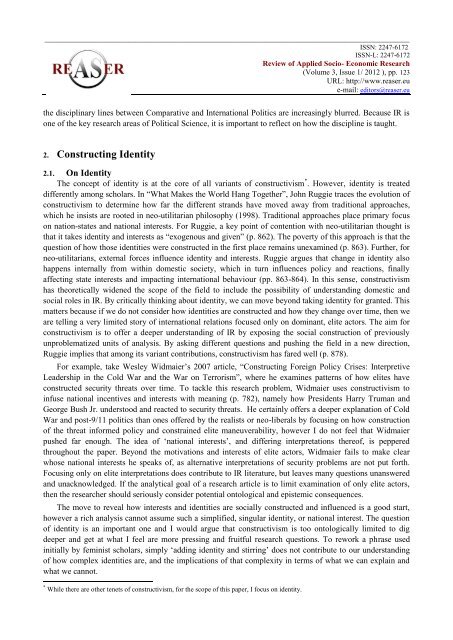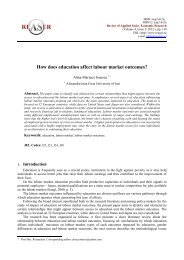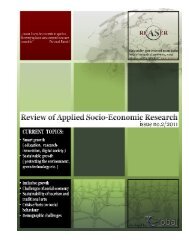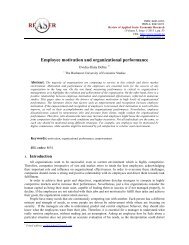Volume 3, ISSUE1/2012 - Review of Applied Socio-Economic ...
Volume 3, ISSUE1/2012 - Review of Applied Socio-Economic ...
Volume 3, ISSUE1/2012 - Review of Applied Socio-Economic ...
Create successful ePaper yourself
Turn your PDF publications into a flip-book with our unique Google optimized e-Paper software.
________________________________________________________________________________________________<br />
ISSN: 2247-6172<br />
ISSN-L: 2247-6172<br />
<strong>Review</strong> <strong>of</strong> <strong>Applied</strong> <strong>Socio</strong>- <strong>Economic</strong> Research<br />
(<strong>Volume</strong> 3, Issue 1/ <strong>2012</strong> ), pp. 123<br />
URL: http://www.reaser.eu<br />
e-mail: editors@reaser.eu<br />
the disciplinary lines between Comparative and International Politics are increasingly blurred. Because IR is<br />
one <strong>of</strong> the key research areas <strong>of</strong> Political Science, it is important to reflect on how the discipline is taught.<br />
2. Constructing Identity<br />
2.1. On Identity<br />
The concept <strong>of</strong> identity is at the core <strong>of</strong> all variants <strong>of</strong> constructivism * . However, identity is treated<br />
differently among scholars. In “What Makes the World Hang Together”, John Ruggie traces the evolution <strong>of</strong><br />
constructivism to determine how far the different strands have moved away from traditional approaches,<br />
which he insists are rooted in neo-utilitarian philosophy (1998). Traditional approaches place primary focus<br />
on nation-states and national interests. For Ruggie, a key point <strong>of</strong> contention with neo-utilitarian thought is<br />
that it takes identity and interests as “exogenous and given” (p. 862). The poverty <strong>of</strong> this approach is that the<br />
question <strong>of</strong> how those identities were constructed in the first place remains unexamined (p. 863). Further, for<br />
neo-utilitarians, external forces influence identity and interests. Ruggie argues that change in identity also<br />
happens internally from within domestic society, which in turn influences policy and reactions, finally<br />
affecting state interests and impacting international behaviour (pp. 863-864). In this sense, constructivism<br />
has theoretically widened the scope <strong>of</strong> the field to include the possibility <strong>of</strong> understanding domestic and<br />
social roles in IR. By critically thinking about identity, we can move beyond taking identity for granted. This<br />
matters because if we do not consider how identities are constructed and how they change over time, then we<br />
are telling a very limited story <strong>of</strong> international relations focused only on dominant, elite actors. The aim for<br />
constructivism is to <strong>of</strong>fer a deeper understanding <strong>of</strong> IR by exposing the social construction <strong>of</strong> previously<br />
unproblematized units <strong>of</strong> analysis. By asking different questions and pushing the field in a new direction,<br />
Ruggie implies that among its variant contributions, constructivism has fared well (p. 878).<br />
For example, take Wesley Widmaier’s 2007 article, “Constructing Foreign Policy Crises: Interpretive<br />
Leadership in the Cold War and the War on Terrorism”, where he examines patterns <strong>of</strong> how elites have<br />
constructed security threats over time. To tackle this research problem, Widmaier uses constructivism to<br />
infuse national incentives and interests with meaning (p. 782), namely how Presidents Harry Truman and<br />
George Bush Jr. understood and reacted to security threats. He certainly <strong>of</strong>fers a deeper explanation <strong>of</strong> Cold<br />
War and post-9/11 politics than ones <strong>of</strong>fered by the realists or neo-liberals by focusing on how construction<br />
<strong>of</strong> the threat informed policy and constrained elite maneuverability, however I do not feel that Widmaier<br />
pushed far enough. The idea <strong>of</strong> ‘national interests’, and differing interpretations there<strong>of</strong>, is peppered<br />
throughout the paper. Beyond the motivations and interests <strong>of</strong> elite actors, Widmaier fails to make clear<br />
whose national interests he speaks <strong>of</strong>, as alternative interpretations <strong>of</strong> security problems are not put forth.<br />
Focusing only on elite interpretations does contribute to IR literature, but leaves many questions unanswered<br />
and unacknowledged. If the analytical goal <strong>of</strong> a research article is to limit examination <strong>of</strong> only elite actors,<br />
then the researcher should seriously consider potential ontological and epistemic consequences.<br />
The move to reveal how interests and identities are socially constructed and influenced is a good start,<br />
however a rich analysis cannot assume such a simplified, singular identity, or national interest. The question<br />
<strong>of</strong> identity is an important one and I would argue that constructivism is too ontologically limited to dig<br />
deeper and get at what I feel are more pressing and fruitful research questions. To rework a phrase used<br />
initially by feminist scholars, simply ‘adding identity and stirring’ does not contribute to our understanding<br />
<strong>of</strong> how complex identities are, and the implications <strong>of</strong> that complexity in terms <strong>of</strong> what we can explain and<br />
what we cannot.<br />
* While there are other tenets <strong>of</strong> constructivism, for the scope <strong>of</strong> this paper, I focus on identity.








